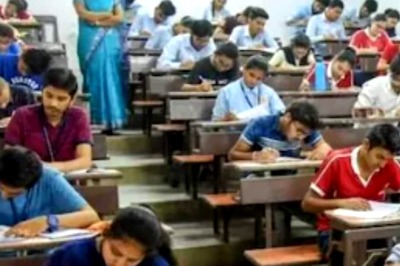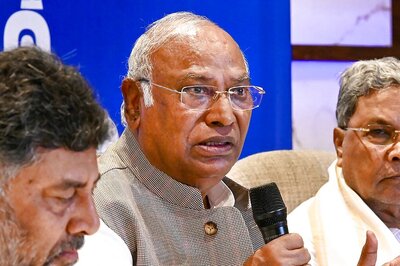
views
The Supreme Court verdict, upholding the contentions of the Department of Telecommunication (DoT) on the definition of Adjusted Gross Revenue (AGR) for the purpose of calculating license fee, is being considered as the last blow to the health of the affected telecommunication companies and the sector.
The news has been covered in a manner to give an impression that the Supreme Court has been somewhat insensitive about the health of the telecom sector; that the decision is not consistent and also not on the expected lines and thereby existing affected telcos have been caught off-guard.
The SC order is the culmination of the long outstanding issue decided in favour of Department of Telecommunications (DoT). It is very comprehensive, reasoned and also consistent with its previous orders on the similar issue.
The question involved in the case was the definition of adjusted gross revenue or AGR (which inter alia includes definition of Gross Revenue or GR as the AGR definition is derived from GR) as defined in clause 19 of the license agreement granted by the Government of India to the Telecom Service Providers (TSPs).
TSPs, subsequent to signing of the contract, were not agreeable to the inclusion of certain items in the AGR for the purpose of calculating licence fees. They were of the view that these items are not income from core activities of their business and therefore not included in the revenue. As per the applicable accounting standard and certain expenditure, losses were also not allowed to be deducted etc. Their views got support from TRAI recommendation and telecom tribunal (TDSAT) judgments, but was consistently rejected by the top court (2010 and 2011 judgments). In the interim (during 2017), the Comptroller and Auditor General (CAG) of India also had serious objections of the telecom firms not following the terms and conditions of the contract in their Performance Audit Report.
The court re-examined various issues in detail and reiterated most of the decisions made earlier.
a) License granted under the proviso to sub-section (1) of Section 4 of the Telegraph Act is in the nature of a contract between the Central Government and the licensee,
b) Once a licensee has accepted the terms and conditions of a licence, it cannot question the validity of the terms and conditions before the court,
c) TRAI and the Tribunal (TDSAT) has no jurisdiction to decide on the validity of the definition of AGR in the licence agreement which were mutually agreed and decided. No one can exclude certain items of revenue which were agreed and included in the definition of AGR in the licence agreement,
d) The definition of revenue has been taken in a broad, comprehensive, and inclusive manner to pose fewer problems of interpretation, and exclusion of certain items was purposely avoided,
e) The definition of ‘gross revenue’ in clause 19.1 is inclusive, and it includes explicitly the revenue from non-licences activities such as installation charges, late fees, sale proceeds of handsets, etc , revenue on account of interest and dividend, value-added services, access or interconnection charges, roaming charges, revenue from permissible sharing of infrastructure; and any other miscellaneous revenue,
f) Clause 19.2 of the agreement excludes only certain items from gross revenue to arrive at the figure of AGR, which are (i) PSTN/ PLMN-related charges (access charges) actually paid to other eligible service providers within India; (ii) roaming revenue passed on to the TSPs (iii) Service tax paid to the government, if gross revenue had included the component of service tax and sales tax. Hence, no set¬off can be claimed for related items of expense etc. on any of the items mentioned above of the inclusive definition and on the miscellaneous revenue.
The order besides being very logical and consistent is also based on fair arguments in accordance with the law.
A comment has been made in the judgment that “even after the licensees agreeing with the revenue sharing regime under the Telecom Policy of 1999 for the last two decades, definition of gross revenue has been litigated upon, though the intendment was to keep it free from the same and various disputes”. The 15 percent AGR was fixed as license fee under "revenue sharing," which was reduced to 13 percent and lastly to 8 percent in 2013 and was more favourable to the telcos.
The comment in paragraph 92 states, “Once benefit has been drawn, the licensees cannot deny validity or binding effect of contract“. It also mentions that the migration to the revenue-based license fees from the fixed licensed regime was primarily to benefit the telcos as they were consistently defaulting in making payments and the purpose was successfully achieved as revenue was increased from Rs 4,855 crore in 2004 to Rs 2,37,636 crore in 2015.
The summary of some other important observations of the order is as follows:
The National Telecom Policy, 1999 Regime had given an option to the licensees to migrate from fixed license fee to revenue sharing license fee on acceptance of all conditions of the migration package. The Policy of 1999 contained the stipulation that the conditions are to be accepted in its entirety, and no dispute concerning the license agreement shall be raised at any future date.
The acceptance of the package be deemed full and final settlement, and after that amendment to the license agreement has to be signed.
The definition of the gross revenue and adjusted gross revenue was devised after holding detailed deliberations and consultations with the stakeholders, considering the recommendation from TRAI and consultation with the accounting expert.
The definition of AGR was designed keeping in mind the revenue share the government wanted from the sector and had nothing to do with accounting policies as such. Therefore, the decision of DoT was a conscious decision
The definitions of Gross Revenue and Adjusted Gross Revenue were purposely kept simple primarily to keep them out of the accounting jugglery and interpretation.
The order is fair as for example, in one place it has accepted the TDSAT view which was logical and was not in confrontation with the terms of the contract, and agreed that bad debts written off earlier, if realised later on, may not be charged again.
The telcos, however, in their own imagination were expecting a favorable judgment despite the fact that the top court had made it very clear in its judgments while dealing with a similar case in 2010 and 2011 itself. They have not even made provisions as per the spirit of accounting standards. The top court’s remarks are very clear that the default was bad in intention and in law.
What are the financial stress in the telecom sector, if any, and the possible reasons for it? The word ‘financial stress’ depicts a condition that is a result of financial and/or economic event that creates anxiety, worry or a sense of scarcity. The word has been used very often since the privatisation of the industry in early nineties by private telcos to demand favorable decisions from the government or regulator. Since then, the telcos have been projecting themselves in a state of perennial financial stress. They have been also successful many a time in getting favorable decisions from the successive governments through the invisible cartelization using strong trade associations (COAI, AUSPI etc) as proxies for influencing the media and government.
However, facts do not match with the propaganda, as all of India’s telecom promoters are (and have been) among the richest in the country and at least few of them have managed to create wealth exclusively from this industry. The flow of funds to the promoters and top management in the form of dividends, sale of stake and salaries continued since inception.
So, how were the extra funds required for acquiring high-value stakes (which were valued high keeping the future cash flow expected at that point in time) and other necessary capital expenditure (capex) requirements arranged? Most of these were arranged through debts, i.e. a financing philosophy called trading on equity (a situation where debt is preferred by the promoters due to its low-cost vis-à-vis expected returns in the business and thereby earn extra income without putting their money at stake). The trading on equity strategy may earn extra profit and generate cash when things are on the expected line but is considered risky as it may cause stress when chips are down, i.e. revenue is falling. The equity option would have been more beneficial if the promoters wanted to share the profit with new shareholders.
Needless to say, the decision of financing through debt and keeping their own fund outside the business was a wrong business decision and the price needs to be paid by the decision-makers only. Another apparent reason for the stress is not creating adequate provisions for the known or anticipated liabilities (e.g., not creating provisions for the disputed license fee in the books of accounts despite Hon’ble Supreme Court’s unfavorable remarks in 2010 and 2011 and the CAG report of 2017) despite having enough profitability and liquidity till 2017.
Instead, the available funds were used (directly and indirectly) for expansion in foreign markets and increasing the stake by hefty payouts. Technological upgradation makes the tech-intensive business competitive and reduces cost. Needless to say, not paying adequate attention to its India business have cost them heavily (Bharti-Airtel CEO Sunil Mittal while responding to a query in an event at Delhi during December 2017 had accepted the same by stating “… when I look back I think if I would have conserved that energy, capital and energy, probably we would have been better placed today in our home market").
The pattern and timing of the promoters’ holdings may reveal some interesting methods of the wealth creation by the promoters of these telcos despite the fact that the industry was stated to be under continued stress since 1994.
The results of the wrong business decisions (or risky decisions) should be accepted as gracefully when they cause loss as they were accepted happily when resulted in an abnormal or exorbitant profit. The telcos have never agreed to share the AGR even as per license agreement and decided to go the legal route to challenge the same despite knowing that the money was supposed to be used for the development of telecom sector in India in an agreed manner. Therefore, they have no moral right (and the legal) to seek for any consideration for the concession from the government or regulator.
As per SC observation, the telcos had backtracked their promises even after signing the contract and even when revenue had increased more than 50 times and despite reducing the licence fee from 15 percent to 8 percent.
The government has already suffered more than Rs 3 lakh crore under the revised policy effective from 1999 (Former communications minister Kapil Sibal made a statement before the Joint Parliamentary Committee in 2011 that the government had lost about Rs 1.5 lakh crore due to this relief package till then). All the affected telcos are still solvent and they hold a good promise after the recently culminated consolidation (the latest annual reports of these telcos also state the rosy picture of the sector) provided they take good business decisions and are able to upgrade themselves to the desired level.
As such more loans and losses are no sign of stress in the sector which has promises in store. All those who are aware of nuances of valuation know that valuation depends on future potential earning and that is how some startup companies despite having losses and debts are having attractive valuation.
The telecom sector in India since 2004 has been a sector with abnormal profit. The telcos in the sector were making money in a planned way through cartelization. They all co-existed and flourished till the new player came. The data charges and voice charges were exorbitant and came down with the entry of new players every time. The new player after a while started co-existing. Following the pattern, the sector was due to undergo the biggest consolidation as abnormal profit charged by them for data and its profitability was difficult to ignore.
The abnormal profit cannot stay for very long in any industry and the price war was imminent. So it is not a stressed situation it is a consolidation phase which is near its culmination. Relatively more efficient and competitive could only survive.
In a nutshell, in an era of Internet of Things (IoT), blockchain technology, robotics, machine to machine etc, the sector has the potential and promise to act as a multiplier in the economy. The short term losses during the consolidation phase cannot be taken as stress and the investor looks for future opportunities (Airtel also started and continued business in African countries despite initial losses). Therefore, the talk of the stress is only to get maximum concessions and no company will exit for sure considering the bright future. And even when if the stress exits, it cannot be attributable to the policymaker as they are result of wrong business decisions.
The Supreme Court decision of giving three months is liberal considering the stringent provisions of the Insolvency and Bankruptcy Code 2016. What is required on part of the promoters and top management of the companies it to take correct decisions at least now. They should willingly share the revenue as agreed in the licence conditions and restore their credibility. The requirement of any concession or package for the affected telcos is, therefore, is not justified as they should be dealt with on equal footing.
(The writer is a former commissioned officer of Accounts Branch of the IAF (1992-2018); registered insolvency professional and registered Valuer (financial assets or securities). He has served as joint advisor in Telecom Regulatory Authority of India (in finance and economic analysis division) during 2016-2018 while on deputation. Views are personal)



















Comments
0 comment